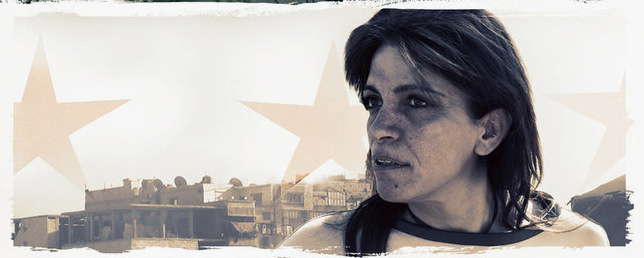Heartbreaking love story offers insight into Syrian tragedy

The tragedies of refugees and those who stayed behind – the victims of the civil war in Syria – have been discussed on various TV programs, news broadcasts and articles. British director Sean McAllister's documentary approaches the subject differently and tells the Syrian tragedy through a love story
The Syrian refugee drama still affects the world, as the war continues in the homeland of refugees who cannot yet return home. British director Sean McAllister unveils the ugly truth about the refugee problem via a love story in his documentary "A Syrian Love Story," which won the Best Documentary award at the European Film Festival and was nominated for Outstanding Debut by a British Writer, Director or Producer. Anadolu Agency (AA) interviewed the British director and asked him about his critically acclaimed documentary and the war-torn Middle East.Speaking to AA, McAllister said he has been working on various documentary projects in the Arab world for the last 20 years.The director aims to offer real human stories from the Arab world to a Western audience. Before arriving in Syria, McAllister wanted to work with a Syrian family in a very sincere atmosphere to capture what is really happening in the region. "I tried to film things that are not standard, in other words I wanted to film the real," the director said. He said that there is a war going on somewhere in the world all the time. "News reports document the things that are occurring at the time, but they never take a look at the individual," McAllister said. "As we see the same things over and over again on TV, we tend to forget that the characters featured in those scenes are actual human beings, as it is hard to relate to them. I lived with a family in Syria, and I filmed that. I recorded every moment they laughed or cried."McAllister's documentary differs from other footage of Syrian refugees that we see every day. He believes that his film, which has been screened at various film festivals, has a deeper affect for understanding the situation of Syrian refugees.He said that directors usually try to tell a story in the most ordinary way possible, adding: "I wanted to tell the story of these people. I visited Syria before the war, and the civil war broke out while I was still in the country. I was financially backed by the TV channel that I worked for, and while I was there film companies also supported me. Hence, I filmed the story of a Syrian family with the revolution and civil war in the background."McAllister said that the family life of two people as the war goes on seemed to be a very universal theme in the first place. Although 90 percent of the raw footage of the documentary was about the civil war and revolution, the British director decided to decrease it to 20 percent, as he believed that individual stories are more universal and easier to relate to for the audience. "The audience was sick and tired of seeing the military aspects of what was going on in Syria," McAllister added.The documentary was born out of McAllister's agreement with the BBC. The documentary was shot for BBC 4, which is the least-watched, but most eclectic BBC channel, and four directors in BBC 4 had to approve the footage. However, after three years of negotiations, the BBC decided to broadcast the documentary on the main BBC 1 channel during prime time. "It was an important step for the channel," McAllister said, "because they broadcast a documentary that was filmed outside Britain at prime time for the first time. It was a great success for me."The love story of the couple Amer and Raghda, who are featured in the documentary, changed entirely when the couple arrived in France after fleeing Syria. "As the producer of the film, I observe their life and love, but I never interfered. Yet when we arrived France nothing turned out as they expected," McAllister explained. The two people who were dreaming about being free finally arrived in a country where people can live freely, but Amer and Raghda began having internal conflicts. The couple asked McAllister to help them, as he knew their story first hand. However, the director chose not to interfere with the couple's relationship and just highlighted the crisis in their relationship in the film. Throughout the production phase, McAlister observed that the couple's children, Shadi, Kaka and Bob, reacted differently to the tragedies that the family had to endure."Like all children their age, they wanted to continue their lives carefree. The family had to move 16 times while I was filming. While people living in the West make moving to another place a big deal, these people had to go through it over and over again. During these times, the children felt like they were in limbo, and naturally their parents could not explain to them the situation they were all in," the director said.Following the premiere of the documentary, it attracted great attention in Europe as well as the rest of the world. "My phone is always ringing," McAllister said, adding: "I am invited to film festivals and panel sessions to discuss my documentary. Currently, I am very busy, so I do not have time to concentrate on another project."
Last Update: January 24, 2016 22:49
